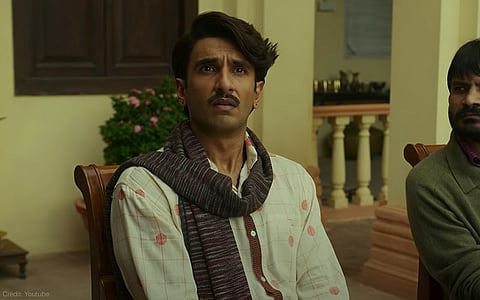
- Reviews
- Power List 2024
- Cannes 2024
- In-Depth Stories
- Web Stories
- News
- FC Lists
- Interviews
- Features
- FC SpecialsFC Specials

Director: Divyang Thakkar
Writer: Divyang Thakkar
Cast: Ranveer Singh, Shalini Pandey, Boman Irani, Ratna Pathak Shah
Cinematographer: Siddharth Diwan
Editor: Namrata Rao
If the Ayushmann Khurrana sub-genre of broad-stroked, social messaging movies and the Rajkumar Hirani sub-genre of feel-good, smiling-through-tears movies had a baby, it would be Jayeshbhai Jordaar. Debutant writer-director Divyang Thakkar creates a sanitized, aimable, sometimes bordering on farcical but always heartfelt saga of a closet feminist who decides to rebel against his awful, overbearing Sarpanch father and protect his wife and unborn daughter.
The story is set in Pravingarh, a fictitious hamlet in Gujarat ruled by the Sarpanch, who is such a neanderthal that when a young girl complains that boys are harassing her, he orders the women in the village to stop bathing with soap because obviously when women smell fresh, men lose control. The Sarpanch's wife isn't much better. She prays obsessively that Jayesh's wife Mudra will deliver a son – their first child, Siddhi, is a girl who she has little affection for. In one scene, she looks at Siddhi and says: Ghagra paltan nahi chahiye. So when Jayesh finds out that Mudra is going to deliver a girl again, he has no choice but to run away. Jayesh and Mudra become perhaps Hindi cinema's first couple to elope after marriage and with two children – one still a foetus.
In this village of toxic men, Jayesh is an anomaly. He has little interest in the power ki parampara which his family dabbles in. When required, he adopts the posturing of mardangi – in one scene, he pretend-beats his wife. But actually, Jayesh is timid and terrified of crossing his father, who bullies and berates everyone around him. In short, Jayesh is the polar opposite of Ram from Goliyon ki Raasleela Ram-Leela, the last time Ranveer Singh played a Gujarati character. In that film, when Ram, whose oiled, muscled chest is frequently on display, is asked about his mardangi, he cockily replies: Meri mardangi ke baare mein aap gaon ki kisi bhi ladki se pooch sakte ho Megji bhai, report acchi hi milegi. By contrast, Jayesh is the sort of undemanding soul, who after several years of marriage hasn't even summoned the courage to properly kiss his wife.
The miracle is that Ranveer is equally terrific in both. With a Chaplinesque moustache and tremulous manner, Ranveer co-creates a character who is loving and lovable. His accent is specific without being caricaturish. And his pliant body language suggests Jayesh's gentle temperament. The film shifts tonality between broad comedy, high emotion and doses of suspense – the sarpanch and his goons are in hot pursuit of Jayesh and his family. These sharp narrative swerves don't necessarily work – there is an outlandish thread about a Haryanvi village where pre-natal testing and female infanticide has killed off almost all the women and the men have understood the inherent tragedy of this. But even when the storytelling gets sloppy, Ranveer doesn't. In one of the film's most moving scenes, Jayesh delivers a stirring speech about the importance of compassion and affection between men and women. He and the village women weep together almost as though they were weeping not just for themselves but for women everywhere and also for men, who are equally stunted by toxic patriarchy. Jayesh obviously doesn't buy into the dictum that men don't cry.
Divyang and his additional screenplay writer Anckur Chaudhry never let the narrative get dark. The Sarpanch threatens his daughter-in-law. At one point, she and her daughter accept a lift, which in another movie and in life, could get nasty quickly, but Divyang and this film keep the rose-tinted glasses on. Jayeshbhai Jordaar makes a larger plea not just for gender equality but also for letting go of superstition and to stop judging people by appearances. Even a black cat gets a moment.
The seriousness of the issues at hand is constantly punctured by humor, which sometimes lands and sometimes doesn't. In the most dire situations, Divyang tries to insert a smile – in one scene, a desperate Jayesh decides that the only way to save his family is by threatening to castrate himself. Because the idea that the family name might not be carried forward by a male heir is the only thing that truly terrifies his father.
Boman Irani skillfully walks the tightrope between many tones of the film – there are moments in which he is actually frightening but also others in which he is a punchline. Shalini Pandey as the beleaguered bahu delivers a combination of subservience and wholesomeness. There is a lovely moment in which Mudra hesitantly remarks that their freedom feels good. There's also Jia Vaidya, solid as Siddhi, the feisty daughter, and Ratna Pathak Shah as Jayesh's acerbic mother. Her arc has an unconvincing suddenness to it but somehow, Ratna makes it work. Stray bits in the film reminded me of Mirch Masala, an iconic woman empowerment film, also set in Gujarat and also featuring Ratna.
But Divyang isn't going for that sort of tough take here. He's created a fairytale. Jayeshbhai Jordaar is a crowd pleaser which urges us, with a sort of bumbling sincerity and sweetness, toward a more equal world. I'll take it.